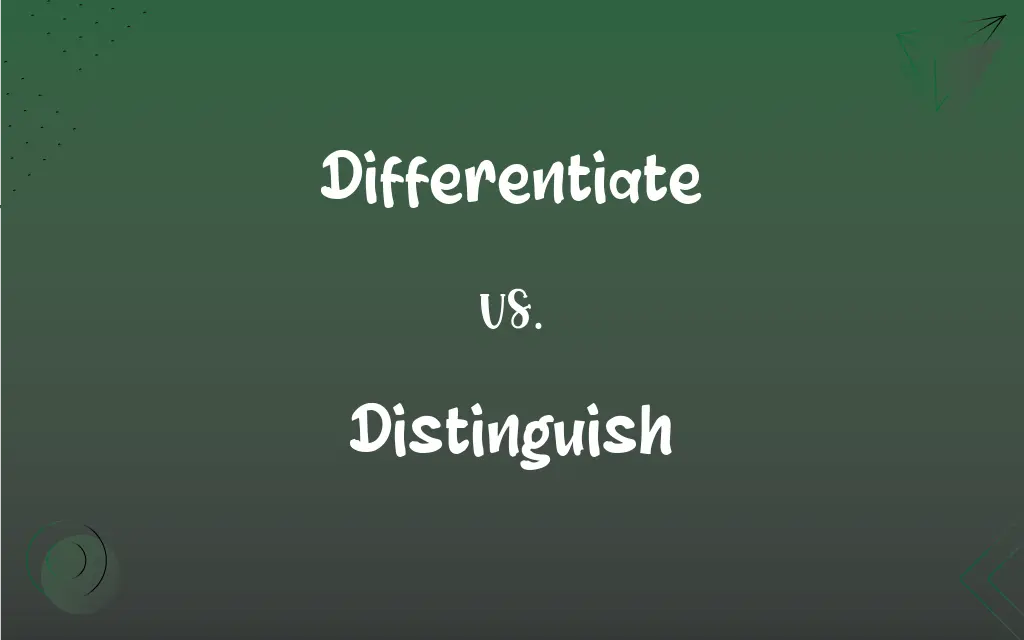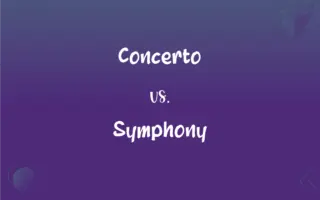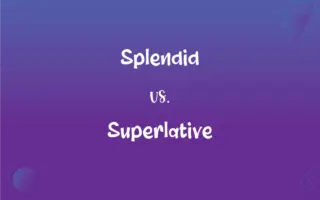Differentiate vs. Distinguish: What's the Difference?
Edited by Aimie Carlson || By Janet White || Updated on September 28, 2023
"Differentiate" implies recognizing or expressing differences between items, while "Distinguish" means to recognize or treat as separate or distinct.

Key Differences
"Differentiate" and "Distinguish" both address the idea of identifying and recognizing differences. Yet, they're used in varied contexts and possess nuanced meanings.
"Differentiate" often speaks to the process of distinguishing or expressing the differences between two or more things. For instance, one might differentiate between types of plants based on their leaves. On the other hand, "Distinguish" leans more towards perceiving, noting, or treating something as unique or distinct from others.
Consider the use of "Differentiate" in education. Teachers strive to differentiate instruction, tailoring it to meet individual students' needs. Contrastingly, "Distinguish" might be used to single out a particular student's unique talent or achievement.
In more technical domains, "Differentiate" can denote the mathematical process of differentiation. "Distinguish", in such contexts, would still adhere to its primary sense of setting apart or recognizing distinct features.
Summarizing, while both words revolve around the concept of differentiation, "Differentiate" is more about expressing differences or categories, whereas "Distinguish" is about recognition and perceiving uniqueness.
ADVERTISEMENT
Comparison Chart
Definition
Recognize or express differences
Recognize or treat as separate or distinct
Contextual Usage
Expressing differences or categories
Noting or perceiving uniqueness
Scope
May imply categories or types
Often about singular uniqueness
Commonality in Usage
Common in educational or taxonomical contexts
Widely used in multiple contexts
Grammatical Form
Often used with "between"
Can be used with "from" or "by"
ADVERTISEMENT
Differentiate and Distinguish Definitions
Differentiate
Be a distinctive feature of.
The services offered differentiate our brand.
Distinguish
Recognize as distinct or different.
He could easily distinguish the calls of various birds.
Differentiate
Evolve differently or cause to evolve differently.
The species began to differentiate millions of years ago.
Distinguish
Perceive or point out a difference.
It's important to distinguish facts from opinions.
Differentiate
Recognize what makes something different.
She can differentiate between various types of wine.
Distinguish
Mark as having a special quality or excellence.
She distinguished herself in the field of science.
Differentiate
Make or become different in the process of growth.
Cells begin to differentiate into various types.
Distinguish
Mark as separate or different.
These factors distinguish the company from its competitors.
Differentiate
To constitute the distinction between
Subspecies that are differentiated by the markings on their wings.
Distinguish
Stand out or excel.
The film was distinguished by its excellent direction.
Differentiate
To perceive or show the difference in or between; discriminate.
Distinguish
To perceive as being different or distinct
Can you distinguish a pattern in this behavior?.
Differentiate
To make different by alteration or modification.
Distinguish
To perceive distinctly; discern
The lookout distinguished the masts of ships on the horizon.
Differentiate
(Mathematics) To calculate the derivative or differential of (a function).
Distinguish
To demonstrate or describe as being different or distinct
A scientist who distinguished four species of the plant.
Differentiate
To become distinct or specialized; acquire a different character.
Distinguish
To be an identifying characteristic of; make noticeable or different
These spices distinguish this style of Asian cooking.
Differentiate
To make distinctions; discriminate.
Distinguish
To cause (oneself) to be respected or eminent
They have distinguished themselves as dedicated social workers.
Differentiate
(Biology) To undergo differentiation.
Distinguish
To perceive or indicate differences; discriminate
Can the child distinguish between right and wrong?.
Differentiate
(transitive) To show, or be the distinction between two things.
Distinguish
To recognize someone or something as different from others based on its characteristics.
Differentiate
(intransitive) To perceive the difference between things; to discriminate.
Distinguish
To see someone or something clearly or distinctly.
Differentiate
To modify, or be modified.
Distinguish
To make oneself noticeably different or better from others through accomplishments.
The soldier distinguished himself in combat and received a medal.
Differentiate
To calculate the derivative of a function.
Distinguish
To make to differ.
Differentiate
To calculate the differential of a function of multiple variables.
Distinguish
Not set apart from others by visible marks; to make distinctive or discernible by exhibiting differences; to mark off by some characteristic.
Not more distinguished by her purple vest,Than by the charming features of her face.
Milton has distinguished the sweetbrier and the eglantine.
Differentiate
To produce distinct organs or to achieve specific functions by a process of development called differentiation.
Distinguish
To separate by definition of terms or logical division of a subject with regard to difference; as, to distinguish sounds into high and low.
Moses distinguished the causes of the flood into those that belong to the heavens, and those that belong to the earth.
Differentiate
(geology) Something that has been differentiated or stratified.
Distinguish
To recognize or discern by marks, signs, or characteristic quality or qualities; to know and discriminate (anything) from other things with which it might be confounded; as, to distinguish the sound of a drum.
We are enabled to distinguish good from evil, as well as truth from falsehood.
Nor more can you distinguish of a man,Than of his outward show.
Differentiate
To distinguish or mark by a specific difference; to effect a difference in, as regards classification; to develop differential characteristics in; to specialize; to desynonymize.
The word then was differentiated into the two forms then and than.
Two or more of the forms assumed by the same original word become differentiated in signification.
Distinguish
To constitute a difference; to make to differ.
Who distinguisheth thee?
Differentiate
To express the specific difference of; to describe the properties of (a thing) whereby it is differenced from another of the same class; to discriminate.
Distinguish
To separate from others by a mark of honor; to make eminent or known; to confer distinction upon; - with by or for.
Differentiate
To obtain the differential, or differential coefficient, of; as, to differentiate an algebraic expression, or an equation.
Distinguish
To make distinctions; to perceive the difference; to exercise discrimination; - with between; as, a judge distinguishes between cases apparently similar, but differing in principle.
Differentiate
To acquire a distinct and separate character.
Distinguish
To become distinguished or distinctive; to make one's self or itself discernible.
The little embryo . . . first distinguishes into a little knot.
Differentiate
Mark as different;
We distinguish several kinds of maple
Distinguish
Mark as different;
We distinguish several kinds of maple
Differentiate
Be a distinctive feature, attribute, or trait; sometimes in a very positive sense;
His modesty distinguishes him form his peers
Distinguish
Detect with the senses;
The fleeing convicts were picked out of the darkness by the watchful prison guards
I can't make out the faces in this photograph
Differentiate
Calculate a derivative; take the derivative
Distinguish
Be a distinctive feature, attribute, or trait; sometimes in a very positive sense;
His modesty distinguishes him form his peers
Differentiate
Become different during development;
Cells differentiate
Distinguish
Make conspicuous or noteworthy
Differentiate
Evolve so as to lead to a new species or develop in a way most suited to the environment
Distinguish
Identify as in botany or biology, for example
Differentiate
Become distinct and acquire a different character
Differentiate
Obtain the mathematical derivative of.
We can differentiate the function to find its slope.
FAQs
Are "Differentiate" and "Distinguish" synonyms?
They overlap but have nuanced differences in meaning and use.
Is "Distinguish" only about perception?
No, it can also mean to stand out or be notable.
Can "Differentiate" be a mathematical term?
Yes, it can mean obtaining a derivative in calculus.
Can "Distinguish" imply excellence?
Yes, it can mean to stand out due to superior quality.
How are the words used differently in education?
"Differentiate" often refers to tailored instruction, while "Distinguish" might note a student's unique ability.
Can both words be used in formal contexts?
Yes, both are appropriate for formal settings.
Which word often pairs with "between"?
"Differentiate" is commonly used with "between".
Which word is broader in scope?
"Distinguish" has a broader range of meanings, from perception to excellence.
Is "Distinguish" always positive?
No, it's neutral but can have positive connotations based on context.
Can "Differentiate" mean evolution or growth?
Yes, it can refer to processes where things become distinct over time.
Can "Differentiate" imply categorization?
Yes, it can suggest categorizing based on differences.
Can "Differentiate" describe brands or services?
Yes, often to highlight what makes them stand apart.
Which word is more about recognition?
"Distinguish" leans more towards recognition.
Do both words relate to uniqueness?
"Differentiate" is about differences, while "Distinguish" can emphasize uniqueness.
Does "Distinguish" only refer to tangible items?
No, it can be used for abstract concepts like thoughts or feelings.
About Author
Written by
Janet WhiteJanet White has been an esteemed writer and blogger for Difference Wiki. Holding a Master's degree in Science and Medical Journalism from the prestigious Boston University, she has consistently demonstrated her expertise and passion for her field. When she's not immersed in her work, Janet relishes her time exercising, delving into a good book, and cherishing moments with friends and family.
Edited by
Aimie CarlsonAimie Carlson, holding a master's degree in English literature, is a fervent English language enthusiast. She lends her writing talents to Difference Wiki, a prominent website that specializes in comparisons, offering readers insightful analyses that both captivate and inform.































































